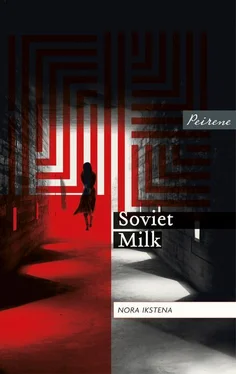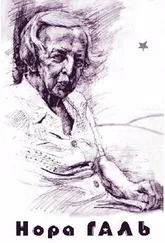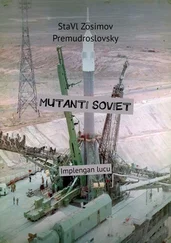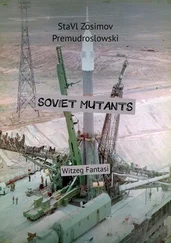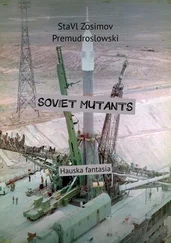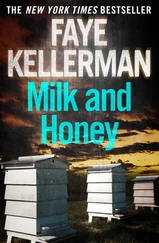For a while my mother and I followed the railway tracks. ‘Be careful of the points,’ she said. ‘Watch that your foot doesn’t get caught.’ I counted the railway ties as my small feet stepped over each one. In the next few years, those tracks were to become my place of contemplation. They brought me closer to my grandparents, who now lived in expectation of my visits. The freight trains that rushed by often scattered kernels of yellow corn onto the embankment. Picking them out of the gravel, I soothed my longing and shortened the long days and weeks of separation.
For the time being, along with the spring, my mother and I did seem to be beginning a new life. The white and blue anemones greeted us from the ditches. The sky was clear, and somewhere in the distance a cuckoo called. The birches were still in that brilliant, bare greenness that dazzles one’s eyes. The spring air mingled with my mother’s cigarette smoke and heralded something new. It drove away the sadness of separation.
In our small house at the edge of the village everything was different. Water had to be fetched from the well, the cooking stove and the pot-bellied stove that heated the house used firewood. The waterless toilet gave off an unpleasant smell. But school and my mother’s workplace, the ambulatory centre, were less than a ten-minute walk away. And we had an overgrown garden in which yellow forest tulips, a couple of plum trees, a mature cherry tree and a cluster of bushes were all blossoming.
My first school day was dreadful. My mother led me to the old brick building and threw me into the lion’s den. The country children were full of suspicion. They stared at me as if I had arrived from a different planet. Their only satisfaction lay in thinking up ways to humiliate me. The teacher looked on with indifference, for she in her turn viewed my mother with great suspicion.
The first month of my new life passed in a fog of tears. Each day after school I walked to the railway tracks, sat on the embankment edge and gazed into the distance. There I allowed my imagination to carry me back to the city and to my grandparents.
My mother left for work early in the morning and returned late at night. I had to take care of myself. I learned how to fire up the wood stove, to bring in water, to do the laundry and to make soup. I lived in one room with a dog which had adopted our home. He was a good and faithful friend, but he passed his fleas on to me.
*
In Leningrad, Serafima changed in front of our eyes. Every other day she would arrive at the Institute with baked treats. She swore that peace and enlightenment had descended upon her husband. He had almost given up drinking, was polite and attempting to take care of her. She was carrying his child, after all. We female doctors were quite a company. Meddlesome bluestockings only interested in cell cultures, the view through our microscopes, complex theories, coffee, cigarettes, more coffee and alcohol. We screwed up our marriages as badly as we mothered our children. And then there was Serafima: an icon of milk and blood, the faithful wife, the blossoming Madonna, the living experiment to prove all our theories.
Serafima grew attached to me, as one does to a teacher or a saint. I couldn’t stand the looks she gave me, combining a childlike naiveté and admiration with something akin to a dog’s faithfulness. Often, when no one was looking, she would try to caress me or make the sign of a cross over me. I tried to hide my annoyance, in order not to hurt her.
One afternoon at the Institute when we were sitting with glasses of tea I told Serafima that I had a daughter. Not only was I not a good mother, but I didn’t feel like a mother at all. Serafima gazed at me with fearful eyes and told me not to say any more. I kept talking. I wanted to sever the umbilical cord of Serafima’s admiration. I told her that I didn’t believe in God, and that I didn’t want to feed my milk to my daughter, so that she couldn’t suck my vileness in with it.
‘Vileness?’ Serafima exclaimed.
‘Yes, Serafima, vileness, this bes – the devil, as it’s called in your language.’
‘But there’s no bes in you, you’re a saint,’ Serafima exclaimed, and it issued so naturally from the bottom of her heart that I was stunned.
She took my hand, placed it on her expanding stomach and said, ‘You gave me this.’ She gazed at me with clear, shining eyes, and for a moment I felt it. A mother’s joy, filling this empty, inhospitable corridor with a tender light. It bestowed sense on a senseless era.
That evening I stayed later at the Institute. The conversation with Serafima had stirred a longing for my daughter, a feeling I hadn’t had for a good while. I wanted to comb her long, rebellious hair, to braid it properly. With my mind’s eye I saw the room where the three of them were having their dinner: my daughter, my mother and my stepfather. My stepfather was surely reading a historical novel about the Stalingrad battle, my mother was knitting or mending something, and my daughter was carefully doing her mathematics or handwriting homework. On the television the news programme had ended and Nora Bumbiere and Viktors Lapčenoks were singing ‘ Laternu stundā’ – ‘In the Lantern Hour’.
I left the Institute at the lantern hour, just as the gaslights were coming on, and hurried to get to the River Neva before they raised the bridges.
Larisa Nikolayevna had become accustomed to my late arrivals home. That night she was waiting for me in the kitchen. She was pale, and on the table before her were a glass of water and a tiny medicine bottle. Serafima had come home with her face badly bruised. Her husband had gone crazy over some trivial thing – drunk, probably. They had had words and he had begun to hit her. Larisa Nikolayevna had helped Serafima wash her face, placed compresses on it and brewed a calming tea. Then Serafima had gone back home. Larisa Nikolayevna had not managed to go to sleep yet.
Something took hold of me. I took the meat-tenderizing mallet and, without removing my coat, went out into the stairwell and over to Serafima’s flat. The door was half-open. Serafima’s husband sat drinking in the kitchen. She had fallen into a painful sleep in the semi-darkness of the back room. ‘O sosedka, prisyad,’ he said – ‘Ah, neighbour, have a seat.’ We drank a shot each. ‘Vydyom pokurim,’ I said – ‘Let’s go out.’ We went out into the stairwell and lit up. ‘Khorosho pyotsya,’ he said – ‘That was a good drink.’ Then I pulled out the meat-tenderizing mallet and hit that bastard in the face several times. And, being drunk, he just howled as if he was being slaughtered.
*
Sometimes after school I would make for my mother’s ambulatory centre and wait for her there. They had one long, narrow corridor, always filled with women sitting on benches, tightly packed together. Some of them were pregnant. My mother tried to give each one as much time as she needed. She often finished work late in the evening.
Usually, I would go straight home after school and prepare supper, which my mother would eat later more out of politeness than hunger. Exhausted, she often went to bed without undressing. I would pull off her boots and cover her with a heavy blanket. I would have to wait for the wood to burn down to cinders before I could close the stove door and go to bed. The dog and I would settle down nearby. The coals smouldered and glowed. Every few evenings I would bake two potatoes in the coals – one for me, one for the dog. When they were ready, we shared this tasty treat and life didn’t seem so bad after all.
The school’s New Year break was drawing near, and my temporary release with it: I’d have two weeks to spend with my grandmother and step-grandfather. At school I had a couple of friendly schoolmates to return to. And a half-year of exile with my mother was over.
Читать дальше
